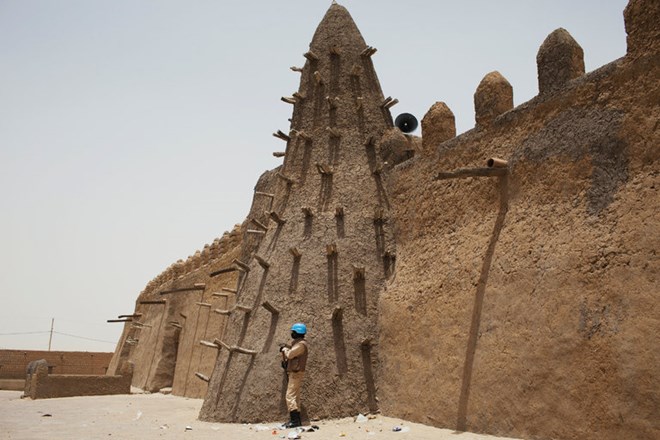
Friday August 18, 2017
By MARLISE SIMONS

Two tombs at the ancient Djinguereber mosque in Timbuktu, Mali, were damaged in an attack by Islamist extremists in 2012. Credit Joe Penney/Reuters
PARIS — The International Criminal Court ruled on Thursday that an Islamist extremist who pleaded guilty last year to destroying shrines and damaging a mosque in the ancient city of Timbuktu, Mali, was liable for damages of $3.2 million.
The man, Ahmad al-Faqi al-Mahdi, a member of a jihadist group linked to Al Qaeda, took part in the smashing of a number of centuries-old mud and stone buildings holding the tombs of holy men and scholars in 2012, when members of his group seized Timbuktu and other parts of northern Mali.
A French-led military force recaptured Timbuktu the next year, and Mr. Mahdi was later arrested in Niger and, at Mali’s request, sent to the International Criminal Court, which is based in The Hague.
He pleaded guilty, and in 2016 was sentenced to nine years in prison for the destruction of cultural property, a war crime. It is the first case in which this international court prosecuted a jihadist for cultural destruction and ordered reparations since extremists began attacking sites that they deemed to violate their interpretation of Islam.
Because Mr. Mahdi, a former teacher, is in prison and penniless, the judges on Thursday asked the court’s Trust Fund for Victims to pay the reparations.
The judges said the money should cover damage to the buildings, economic losses suffered by local residents and moral harm caused by the loss of the city’s cultural heritage.
In their summary, the judges said that the attacks on the nine shrines and a mosque carried “a message of terror and helplessness,” destroyed “part of humanity’s shared memory and collective consciousness” and rendered “humanity unable to transmit its values and knowledge to future generations.”
The judges also said that some individuals might be compensated if they could show that their livelihoods had depended on the religious sites and the pilgrims and tourists who used to visit the city. The court’s ruling on Thursday also suggested that some of the money could be used for a memorial or some other commemoration or community program for the residents of Timbuktu.
Pieter de Baan, the director of the Trust Fund for Victims, whose management is separate from the court, said he was pleased with the ruling “because it was clear and helpful in its outline.” Mr. de Baan said the trust fund would need to raise money from governments and other sources.
He said his team would also have to track down people who might be eligible for individual compensation. That task will not be easy, he said, because many people have fled amid the upheaval in the area.

Ahmad al-Faqi al-Mahdi, left, in court in The Hague, pleaded guilty in 2016 to destroying shrines and damaging a mosque in Timbuktu, Mali. Credit Robin Van Lonkhuijsen/Agence France-Presse — Getty Images
It is unclear whether Mr. de Baan’s team can operate in northern Mali, which diplomats say remains unsafe as various factions fight for power and smugglers and kidnappers are active.
The nine shrines that were destroyed and the mosque in Timbuktu that was damaged by the “morality brigade” that Mr. Mahdi led have already been rebuilt with the assistance of foreign donors.
The original Timbuktu shrines, brick and mud structures built from the 15th to 17th centuries atop the graves of Muslim scholars, were modest in comparison with the massive Buddha statues destroyed in Afghanistan and the Roman ruins demolished by the Islamic State in Syria and uncounted historical sites in Iraq. But no international court has jurisdiction over such crimes in those countries or over the continuing cultural devastation reported in Yemen.